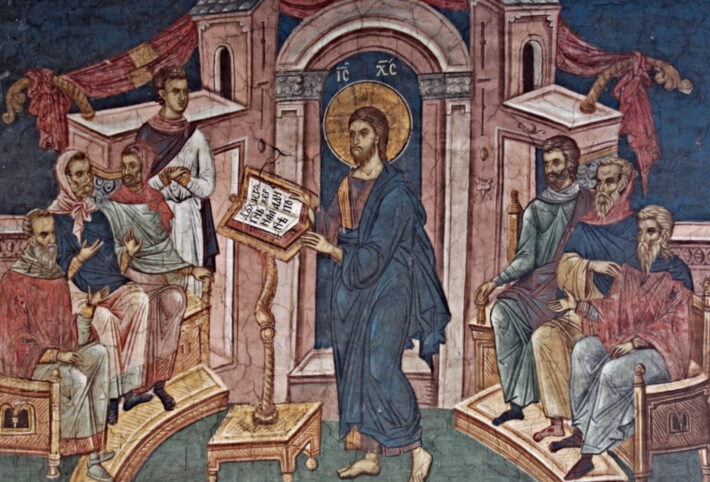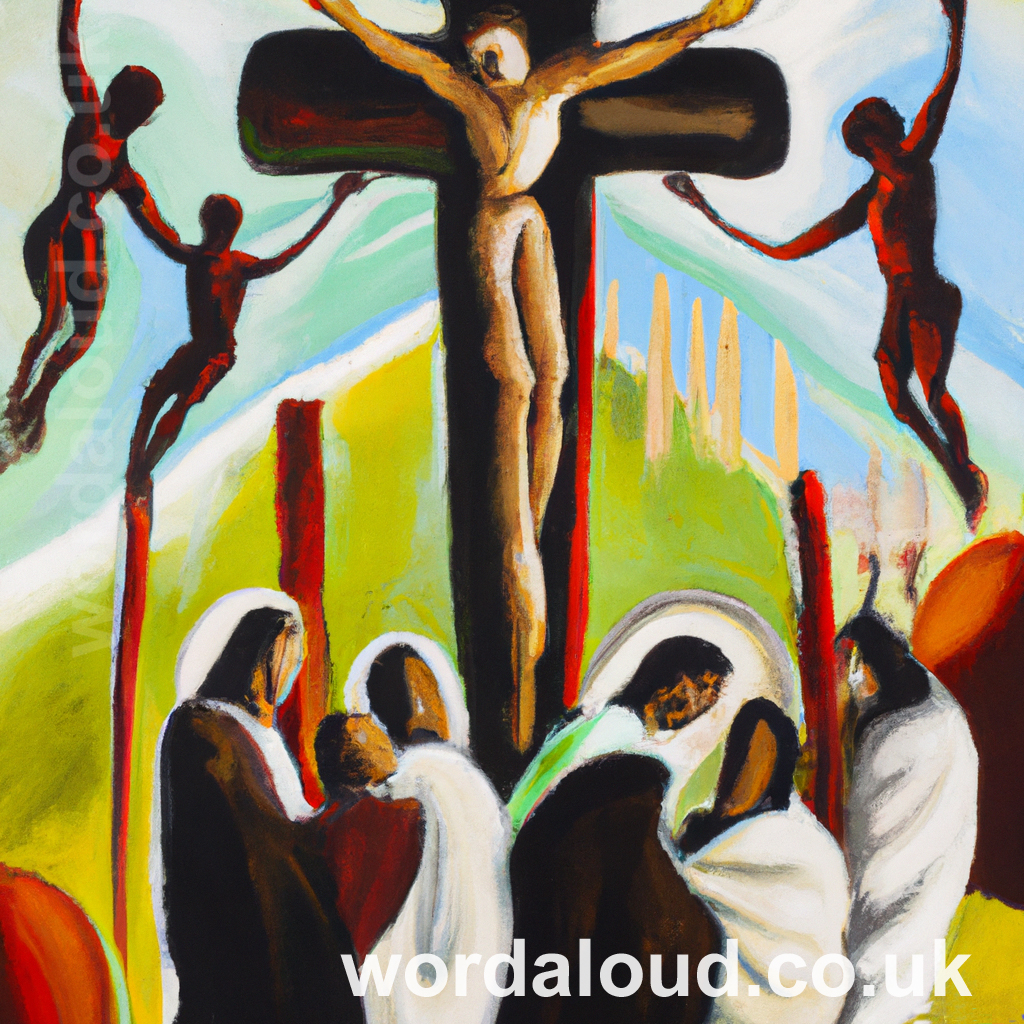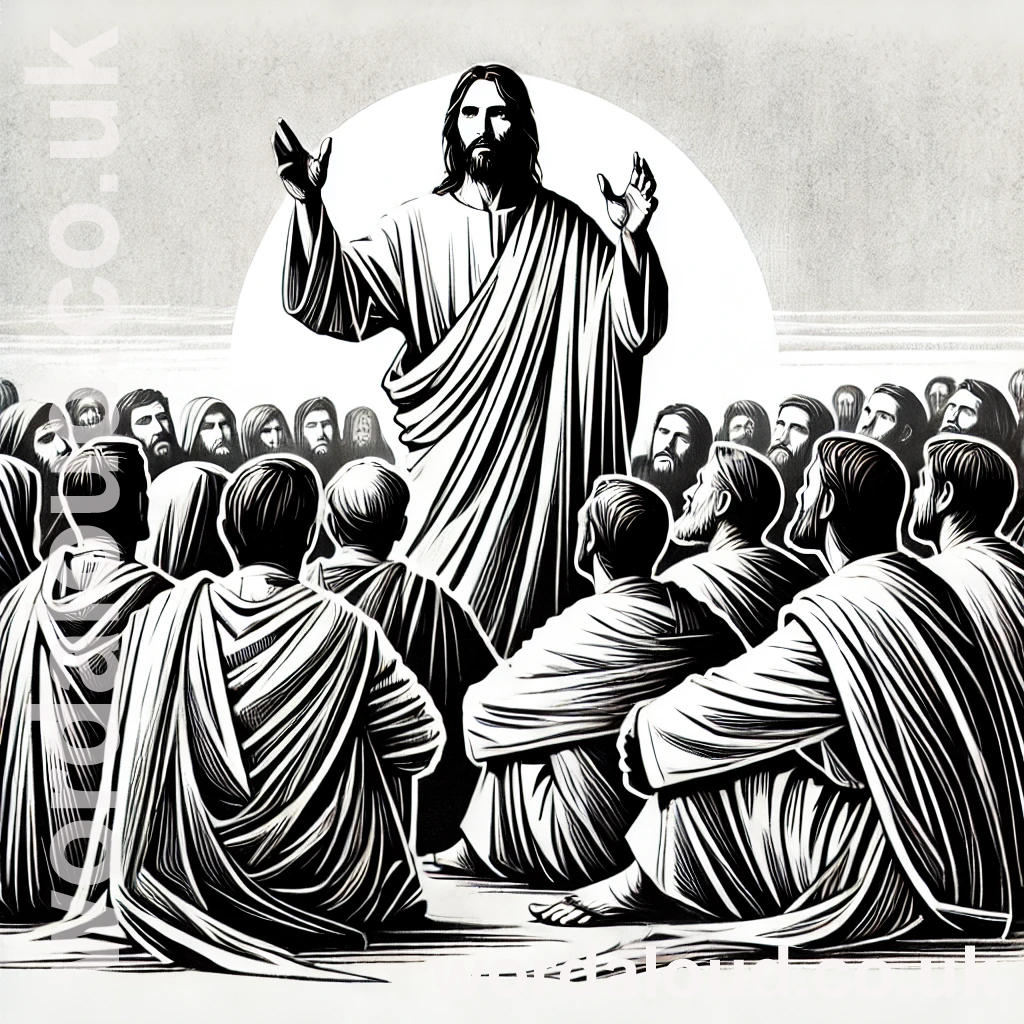Christian Art | King James Audio Bible KJV | Daily Bible Verses Advent
Matthew 11: 16-19 | King James Audio Bible | Daily Bible Verses Advent
16 ¶ But whereunto shall I liken this generation? It is like unto children sitting in the markets, and calling unto their fellows,
17 And saying, We have piped unto you, and ye have not danced; we have mourned unto you, and ye have not lamented.
18 For John came neither eating nor drinking, and they say, He hath a devil.
19 The Son of man came eating and drinking, and they say, Behold a man gluttonous, and a winebibber, a friend of publicans and sinners. But wisdom is justified of her children.
The image of children in these Bible verses is curious. We could read the lines as suggesting childishness, with one group of children expecting to amuse another and reacting peevishly when those others do not move according to the music they play. We could more broadly read these verses as suggesting a disconnect between various children, a failure of communication, recognition, response, which is emblematic of Christ and his followers and those who reject him. We could hear those children as playing false music, as those who rejected Jesus clung to the teachings and traditions of the past, shutting themselves off from knowledge of the new. The note of complaint, along with lack of understanding, is evident.
Jesus tells us how the people of ‘this generation’ seem to have rendered themselves incapable of knowing truth by their insisting on trying to see evil where there is only good. John worked courageously to serve God, and yet they claim his fasting was evidence of demonic possession. Jesus eats and drinks freely, and so this too is vilified. Both John the Baptist and Jesus operate outside of the Jews’ known normative context – and, of course, Jesus does feast with sinners. The challenge, wherein so many fail, is to put aside preconceptions and deliberate misprisions and to recognize the absolute good that is clearly here.
We are alerted to the malice of those who oppose Jesus, and who will go on to torment his followers. In our lifetimes, we are alerted to the danger of failing to recognise the good, or of rejecting the good, through some knee-jerk habit of thought or prejudice – we are alerted to false ideologies which seek to choke living faith. And we are asked to follow Christ with confidence that wisdom is justified.
BLESSED is the man that walketh not in the counsel of the ungodly, nor standeth in the way of sinners, nor sitteth in the seat of the scornful.
2 But his delight is in the law of the Lord; and in his law doth he meditate day and night.
3 And he shall be like a tree planted by the rivers of water, that bringeth forth his fruit in his season; his leaf also shall not wither; and whatsoever he doeth shall prosper.
4 The ungodly are not so: but are like the chaff which the wind driveth away.
5 Therefore the ungodly shall not stand in the judgment, nor sinners in the congregation of the righteous.
6 For the Lord knoweth the way of the righteous: but the way of the ungodly shall perish. (Psalm 1)
Concluding Prayer | Love Revealed By Jesus Christ
Lord, keep us ever alert and watchful
as we await the coming of your Son,
so that, Faithful to his teaching,
we may hasten to meet our Saviour with lamps alight.
We make our prayer through our Lord.
![]()

King James Audio Bible | Endnotes
Jesus speaks of the importance of coming to God with childlike faith. He says that children are closest to the kingdom of heaven and that they come without reservation. Jesus encourages people to become like children in their faith so that they can enter the kingdom of heaven.
This thought highlights the humility and simplicity that Jesus values in relationship. It also suggests that a person’s faith and relationship with Jesus should be free from complexities and restrictions that often come with religious institutions and traditions.
In the Garden of Gethsemane, Jesus prayed for strength and guidance as he faced his impending crucifixion. Jesus demonstrated deep devotion to God the Father, showing that he valued his relationship with the Father above all else – an example to Christians of importance of prayer and the humility it takes to submit to God’s will.
Suffer Little Children To Come Unto Me
Becoming as a child is cited as a requirement for entering the kingdom of heaven. The idea of childlikeness is mentioned in several passages in the New Testament, including Matthew 18:3-4, Mark 10:15, and Luke 18:17. In these verses, Jesus emphasizes the importance of humility and innocence, traits commonly associated with children, in the spiritual journey of believers.
Theologian C.S. Lewis writes in his book Mere Christianity: ‘Until you have given up yourself to Him you will not have a real self…Until you know you are mine you will try to other people, try to love and to be loved, which you cannot do.’ Lewis’s words illustrate the idea that in order to enter the kingdom of heaven, one must surrender their own desires and beliefs to those of Jesus. Children are often seen as embodying this level of surrender and trust, which is why Jesus calls for his followers to have a childlike faith.
Pope Francis has spoken on the importance of childlikeness in one’s faith journey. In a homily in 2013, Pope Francis stated: ‘When we are children, we are open, we are spontaneous, and we are ready to love and to be loved. This is what Jesus wants us to be like. He wants us to be like children, always ready to be hugged, to love and to be loved.’ The Pope’s words highlight the idea that a childlike faith is characterized by openness, love, and a willingness to receive love from others.
Many biblical scholars believe that becoming like a child means embracing humility, innocence, and a trusting relationship with God. In his book The Sermon On The Mount, biblical scholar Martin Lloyd-Jones writes: ‘We must become like little children in our relationship with God, not only in our attitude toward Him but also in our trust of Him.’
This idea is also reflected in the teachings of Saint Therese of Lisieux, who is known for her childlike devotion to God.
Jesus On The Cross Is Childlike.
That Jesus on the Cross is childlike is a complex theological concept that has been interpreted in various ways by different Christian denominations. Some argue that the crucifixion of Jesus represents a return to a state of innocence, similar to that of a child, as he bears the sins of humanity and experiences complete abandonment by God. This interpretation emphasizes the idea that through his sacrifice on the Cross, Jesus becomes a symbol of humility and surrender, embodying the childlike traits of trust and dependence on God.
In his book The Cross And The Beatitudes, biblical scholar Michael J. Gorman writes: ‘In his death, Jesus is like a child who is completely vulnerable and dependent upon his parents, completely trusting them even in the face of suffering and death.’
This idea is reflected in the teachings of St. Paul, who wrote in Philippians 2:5-8: ‘Let this mind be in you, which was also in Christ Jesus: Who, being in the form of God, thought it not robbery to be equal with God: But made himself of no reputation, and took upon him the form of a servant, and was made in the likeness of men: And being found in fashion as a man, he humbled himself, and became obedient unto death, even the death of the Cross.’ This verse supports the idea that Jesus’ death on the Cross is a display of humility and obedience, much like that of a child.








